“Spend as much on glass as on your gun” is something long-range shooters take to heart.
Good quality glass, proper magnification, and a reticle that works with you can distinguish between making a hit at a distance or missing by a few inches.
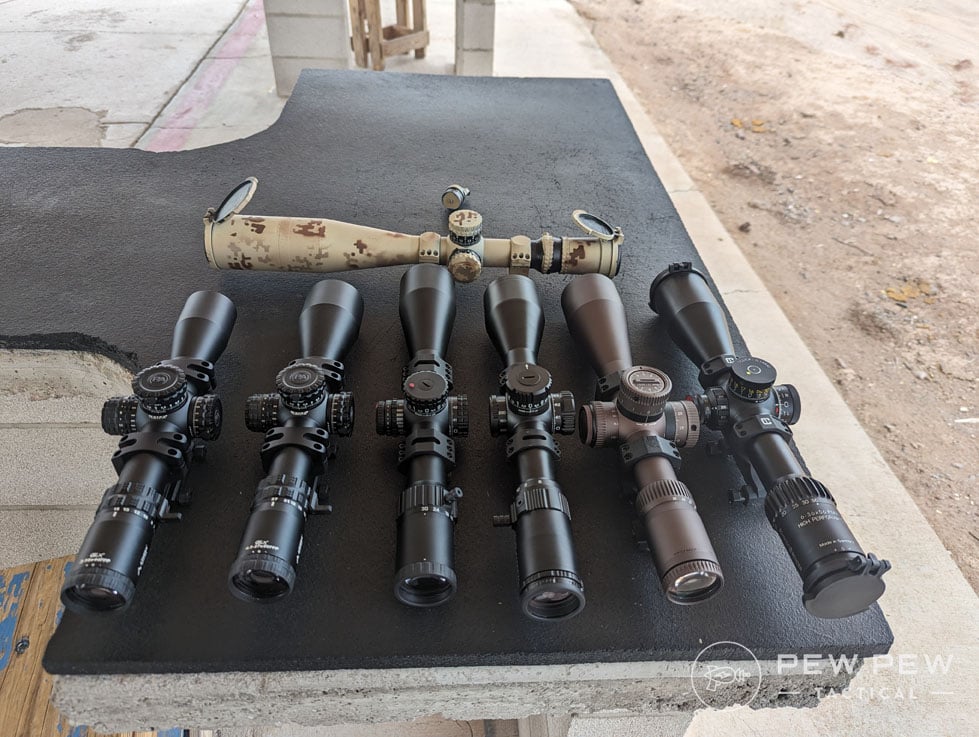
I’m going to highlight and review some scopes that I and others have used to shoot at 800 yards or further.
Keep in mind that while this list serves as a great starting point for long-range scopes, there are many more out there, some worth considering and many that are not.
Before jumping in and making an expensive purchase, do your homework, vet the sources, and make sure it is what you want.
THE QUICK LIST
-
Best Budget Scope
-
Best Tactical Long Range Scope
-
Best Mid-Tier Scope
-
Most Durable
-
Best Glass
-
Best High End Long Range Scope
Table of Contents
Loading…
How We Tested the Scopes
We tested six scopes received from their respective manufacturers. So that there was consistency in the review, all scopes are first focal plane with MIL reticles.
The scopes all fell within the 4-36 magnification range (with one exception noted below), as this is generally the range that works best for shooting out to about 1,000 yards.
I want to add that it is possible to shoot to 1,000 with lower top-end magnification (I started with a 3-15 scope); however, more magnification generally makes it easier to be consistent.
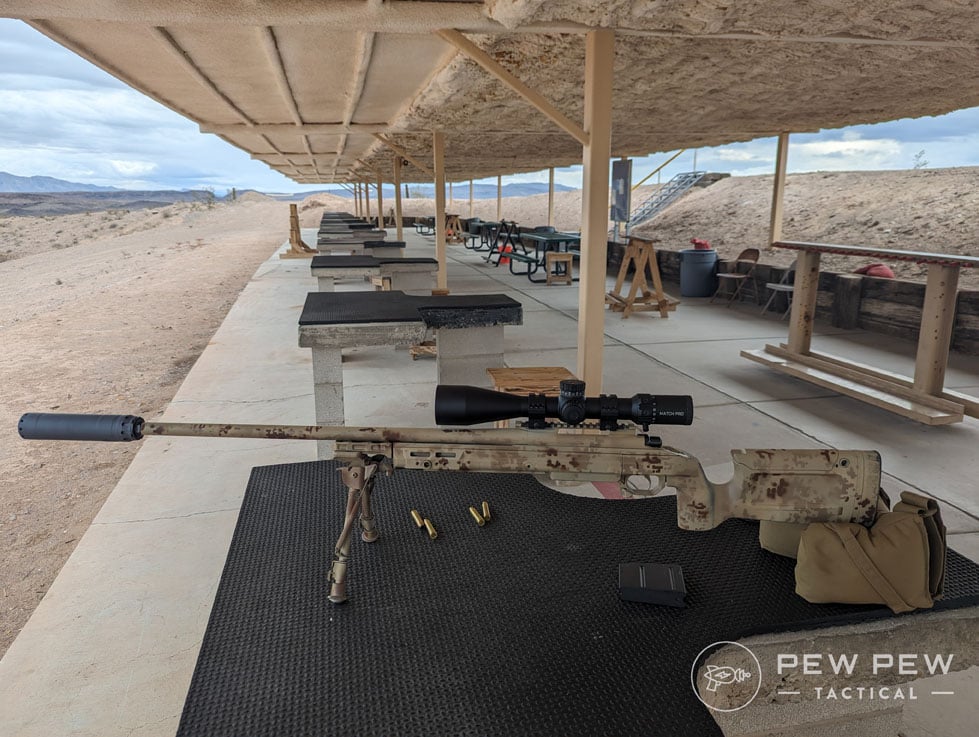
All shooting was done at a temperature of 55 degrees F, 29.98 barometric pressure, and 2,510 feet above sea level.
One of the tests each scope was put through was tracking.
This measures two different metrics with one test and is something many serious shooters look for in a scope. The test is fairly straightforward, you pick a point to aim at, then dial a certain number of clicks on the vertical axis, and then a certain number of clicks on the horizontal axis.

You fire a shot and check the point of impact based on your point of aim, comparing the deviation to the reticle to see if the amount you dialed matches the marks on your reticle. You then dial back to your original position and check the point of aim and point of impact to see if the turrets cause any deviations.
For my testing, I had the gun braced on a rear bag with an Armageddon Gear game changer on top of it, resting the end of the chassis in the valley of the bag.
At the end of the test, I rated all the scopes based on clarity, eye box, magnification, and value. For more on how we developed our rating standards and an in-depth look into each model’s rating in each category, scroll down to our By the Numbers Section.
| Model | Magnification | Reticle | Eye Relief | Weight |
| Bushnell Match Pro ED 5-30×56 | 5-30x | Illuminated DM2 | 3.8″ | 32oz |
| Bushnell Elite Tactical 6-36×56 XRS3 | 6-36x | EQL | 4″ | 38.9oz |
| Primary Arms GLx 3-18×44 | 3-18x | ACSS Athena BPR MIL | 3.5″ | 29.6oz |
| Vortex Razor HD Gen III 6-36×56 | 6-36x | EBR-7D (MOA) | 3.5″ | 45.1oz |
| Nightforce ATACR 7-35×56 | 7-35x | MIL-XT | 3.6″ | 39.3oz |
| Schmidt & Bender PMII | 6-36x | Gr2ID | 3.5″ | 33.1oz |
Best Long Range Scopes
1. Bushnell Match Pro ED 5-30×56 – Best Budget Long Range Scope
Prices accurate at time of writing
Prices accurate at time of writing
-
25% off all OAKLEY products - OAKLEY25
Copied! Visit Merchant
Pros
- Well-designed, illuminated reticle
- Inexpensive
- Intelligently designed turrets
Cons
- Magnification adjustments not so easy
- Didn't seem as clear as other models
Specs
- Magnification x Objective Lens: 5-30x56mm
- Reticle: Illuminated DM2 – 2/10 grid style with floating center dot
- Illuminated: Yes
- Tube Diameter: 34MM
- Weight: 32 oz.
- Eye Relief: 3.8 in.
- Lens Coating: Fully Multi-Coated
- Elevation Adjustment: 30 MRAD
- Windage Adjustment: 14.5 MRAD
- Water Proofing: IPX7
- Fog Proofing: Yes, Argon Gas Purged
The Match Pro ED is a newer scope for Bushnell in the sense that it is a redesign of their 2019 Match Pro Scope. Bushnell reached out to competition shooters running their scope and requested feedback on what needed to be included, removed, changed, and reimagined.
The Match Pro ED was the result, and the claim is that it was developed to be the most advanced optic at its price point.
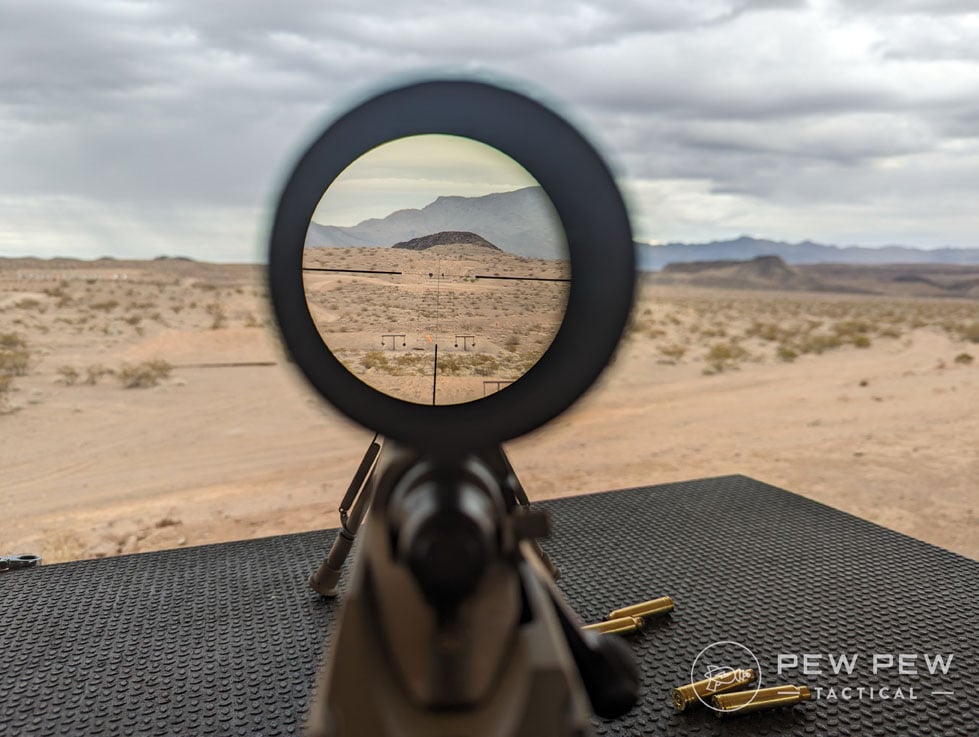
The main tube was expanded to 34mm from the 30mm original design. This allowed for the elevation to be beefed up, allowing for a full 30 MRAD of travel and a full 14.5 MRAD of adjustment for windage. This is a huge change over the original, which offered only 18 MRAD of elevation.
The objective lens was bumped up from 50mm to 56mm, allowing more light and a crisper sight picture. The Extra-Low Dispersion Prime (ED) glass is another stellar upgrade; it is much crisper than the original Match Pro glass, with very little distortion, even at the outer edges. The outer surfaces feature Bushnell’s EXO Barrier, which is designed to keep the glass free from moisture and debris.
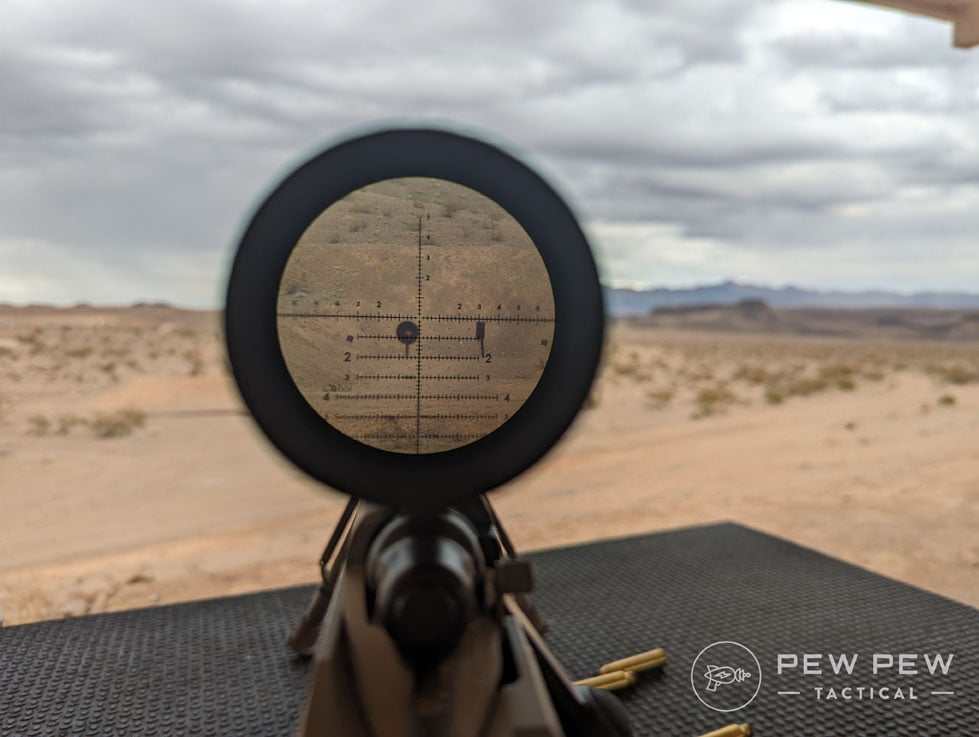
The turrets on the Match Pro ED are one of the best parts of the scope. The large turrets have a very positive feel when moving from one click to the next. The base 10 system is easy and fast to use, with the Rev-Indicator being an ingenious idea.
Two-stage indicators tell you the revolution you’re on when dialing on your elevation turret. The zero stop is easy to set and effective. The Match Pro passed the tracking test, which isn’t surprising as Bushnell has prided itself on being amongst the most consistent tracking scopes on the market.
2. Bushnell Elite Tactical 6-36×56 XRS3 with EQL Reticle – Best Tactical Long Range Scope
Prices accurate at time of writing
Prices accurate at time of writing
-
25% off all OAKLEY products - OAKLEY25
Copied! Visit Merchant
Pros
- Smart reticle design and layout
- Crisp turrets with an easy zero stop setting
- Clear glass with ED coating
Cons
- No illumination
- Slightly lower field of view
Specs
- Magnification x Objective Lens: 6-36x56mm
- Reticle: EQL
- Illuminated: No
- Tube Diameter: 34MM
- Weight: 38.9 oz
- Eye Relief: 4.0 in
- Lens Coating: Fully Multi-Coated
- Elevation Adjustment: 29 MIL
- Windage Adjustment: 15 MIL
- Water Proofing: IPX7
- Fog Proofing: Argon Gas Purged
The Elite Tactical has been a constant in the Bushnell scope lineup for over 20 years. The scopes were designed with direct feedback from professional shooters and incorporated both reticle designs and features on the scope that aid in their use without feeling cumbersome.
Machined from a single piece of billet aluminum, the 34mm tube is rugged enough for hard use. The 56mm objective lens is multi-coated to offer increased light transmission over the XRS II (the previous generation of the Elite Tactical).
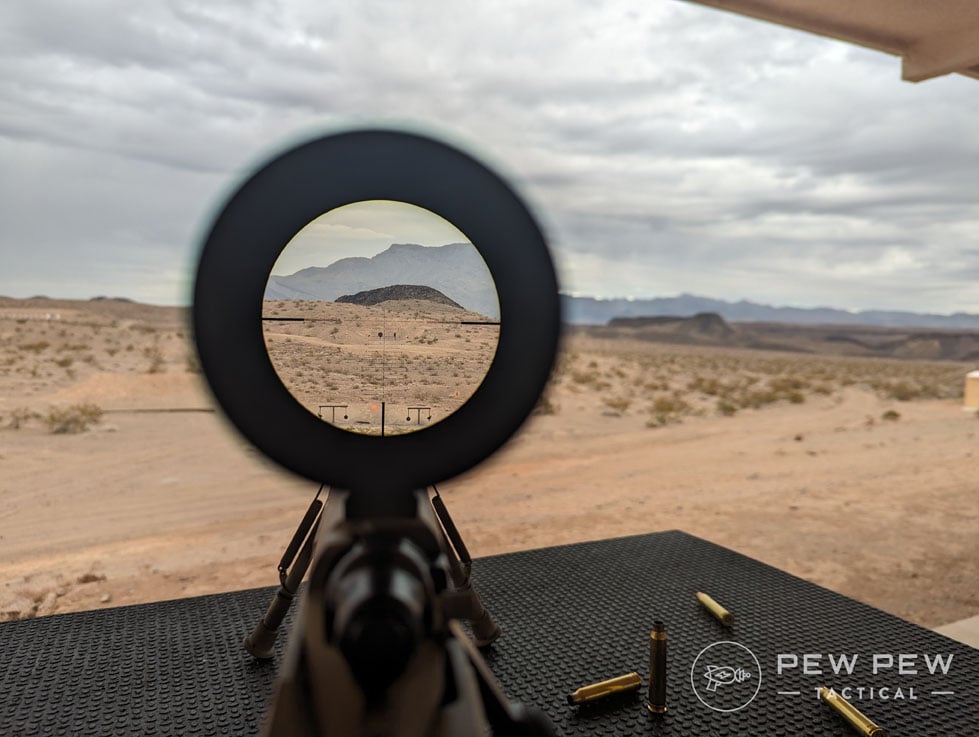
Additionally, the XRS3 has a greatly improved eye box over the XRS II. The XRS3 also features a locking diopter, which is useful for moving from stage to stage or hunting in the woods. This ensures that if you smack your scope against something, your diopter adjustment has not moved, leaving you with the same clear view you had previously.
The turrets on the XRS3 have crisp, defined clicks for adjustment. The turrets have large markings that are bright enough to see in dim conditions but aren’t glaring. The Revlimiter zero stop is easy to set, robust enough to ensure your zero is easy to return to, and requires only minimal tools to set or adjust. The XRS3 passed the tracking test with 100% accuracy on both the amount of adjustment being true and the return to its original position.
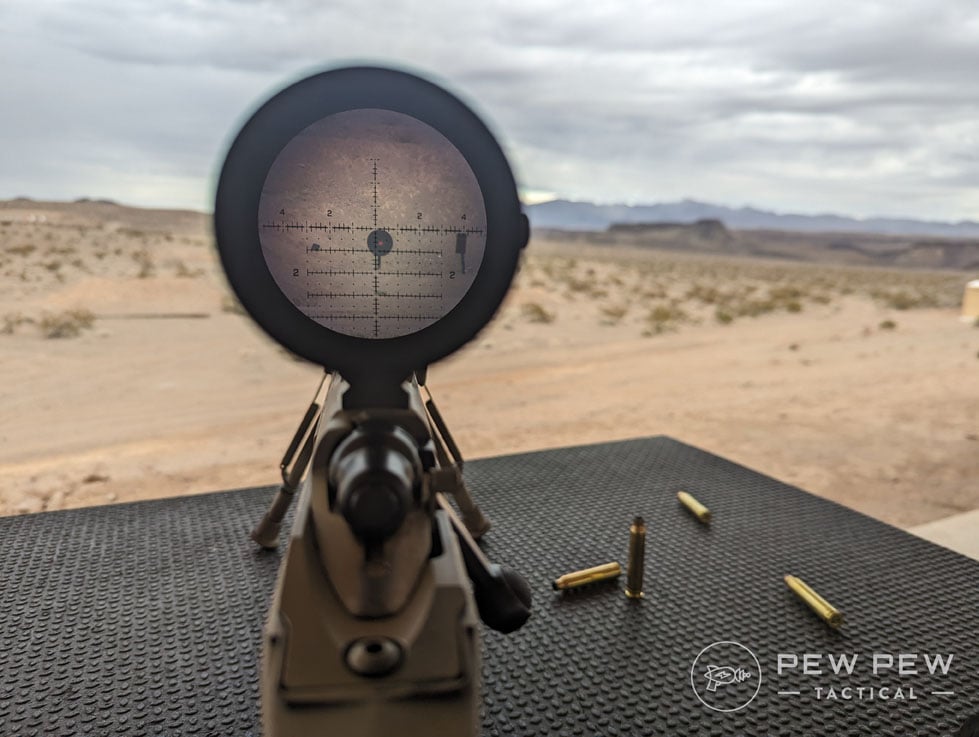
In terms of looking through the scope, the XRS3 does not disappoint. With a generous 4-inch eye relief, you don’t feel crowded when setting up on the optic, and the eye box is equally as robust. Bushnell claims that at 36x magnification, the eye box is the same on the XRS3 as it was on the XRS II at 30x.
There was minimal tunneling when scaling the magnification down from 36 toward the lower end, and the EQL reticle did not feel crowded or cumbersome. The multiple floating dots along both axes were a pleasant surprise, as I found them making the reticle feel like it obscured less of the target.
3. Primary Arms GLx 3-18×44 with ACSS Athena BPR Reticle – Best Mid-Tier Scope
Prices accurate at time of writing
Prices accurate at time of writing
-
25% off all OAKLEY products - OAKLEY25
Copied! Visit Merchant
Pros
- Reticle is smartly designed and very easy to use
- Turrets are robust and accurate
- Glass is a significant upgrade compared to the SLx scope line
Cons
- Slight edge distortion
- Eye box was less forgiving than other scopes at this price point.
- Lower magnification range
Specs
- Magnification x Objective Lens: 3-18×44
- Reticle: ACSS Athena BPR MIL
- Illuminated: Yes
- Tube Diameter: 34MM
- Weight: 29.6 oz
- Eye Relief: 3.50 in
- Elevation Adjustment: 180 MOA
- Windage Adjustment: 120 MOA
Primary Arms has been constantly improving its line of scopes over the years. Their GLx line, though advertised as their mid-tier offerings, is the place you want to begin looking if Primary Arms scopes are of interest to you.
The SLx line, while inexpensive, lacks the quality necessary to compete in the long-range world. The GLx line, on the other hand, is worth a look for entry-level scopes that are packed with features that make sense, don’t carry unnecessary fluff, and can get the job done without breaking the bank.
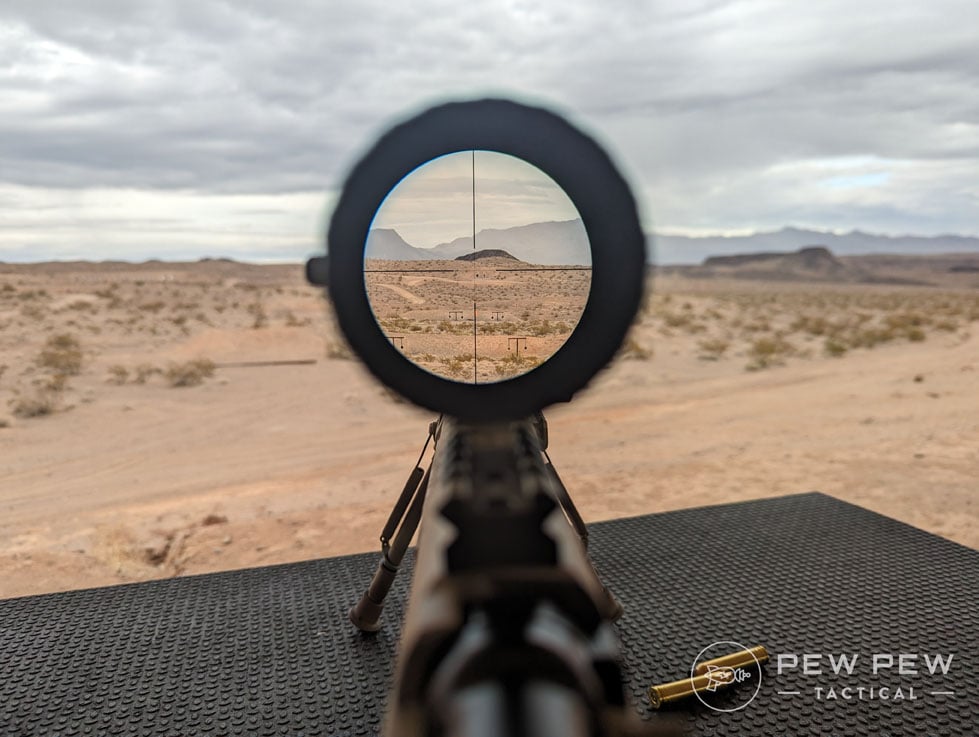
Of the two scopes I tested from Primary Arms, the GLx 3-18 and the GLx 4.5-27, the latter is my go-to. I did a full write-up on it, and I encourage you to check that out. The 3-18 is what I’ll cover here.
The main tube is 34mm and is less than 14 inches long. Its turrets are robust and offer distinct feedback on adjustments. They contain 180 MOA elevation of adjustment and have a locking mechanism to guard your zero as well as an intuitive zero return.
The glass on the GLx line is one of the biggest upgrades from the SLx scopes. Primary Arms calls it “premium glass,” and compared to their lower-tier line, I’d say it is the case. The 3-18 does have a bit more edge distortion than the 4.5-27, but most of the view is crystal clear (I will note that this could be a one-off issue; the 4.5-27 had edge-to-edge clarity).
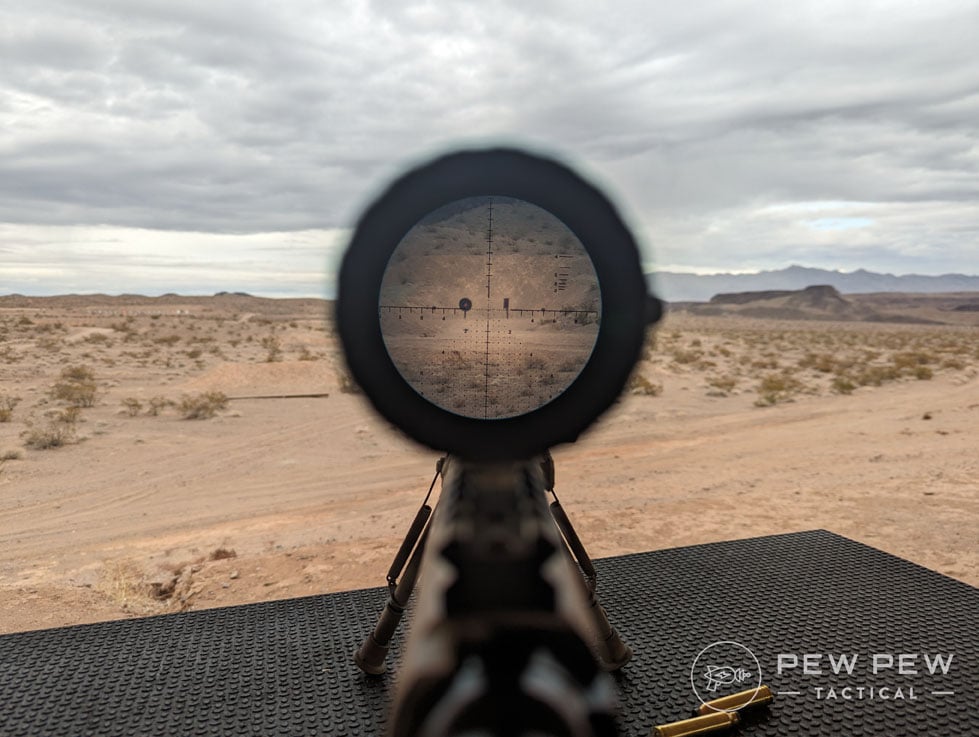
The ACSS Athena BPR reticle is something that caught me off guard. On their LPVO scopes, I found the reticle clunky and difficult to use quickly. The exact opposite is the case with the scopes for longer-range shooting.
The chevron at the center, once you adjust to aiming with the point, is precise and easy to adopt. The layout of the reticle allows for ranging, using holdovers with confidence, and can be used in conjunction with a ballistic calculator to do some truly nifty math.
I do want to note that between the two, the 4.5-27 would be my choice for a long-range scope if there were no restrictions. The 3-18 would only be something I’d consider if I were restricted by divisional rules, especially considering that the 4.5-27 is only $100 more.
4. Vortex Razor HD Gen III 6-36×56 with EBR-7D MRAD Reticle – Most Durable Long Range Scope
Prices accurate at time of writing
Prices accurate at time of writing
-
25% off all OAKLEY products - OAKLEY25
Copied! Visit Merchant
Pros
- Crystal clear glass
- Infinite Zero possibilities, including between turret clicks.
- Rugged design
- Vortex’s legendary warranty protects it.
Cons
- High price
- Longer scope which requires an appropriate gun to mount it on
Specs
- Magnification x Objective Lens: 6-36x56mm
- Reticle: EBR-7D (MOA)
- Tube Diameter: 34MM
- Weight: 45.1 oz
- Eye Relief: 3.5 in
- Lens Coating: XR Plus Fully Multi-Coated
- Elevation Adjustment: 120 MOA
- Windage Adjustment: 52.5 MOA
Vortex is going to be my dark horse for the article. While I’ve used several of their riflescopes throughout the years, I’ve mostly considered them a middle-of-the-road item. The quality ranges with the price point, but they have some of the best customer service in the industry.
I’ve neither been disappointed nor blown away by any of their offerings up until a few years ago. Then they dropped the Razor HD 1-10, and my attention was fully grabbed. Vortex’s Razor HD line, for me, put them on the map as a serious contender for high-end scopes. The Razor HD Gen III 6-36 solidified that mindset and then some.
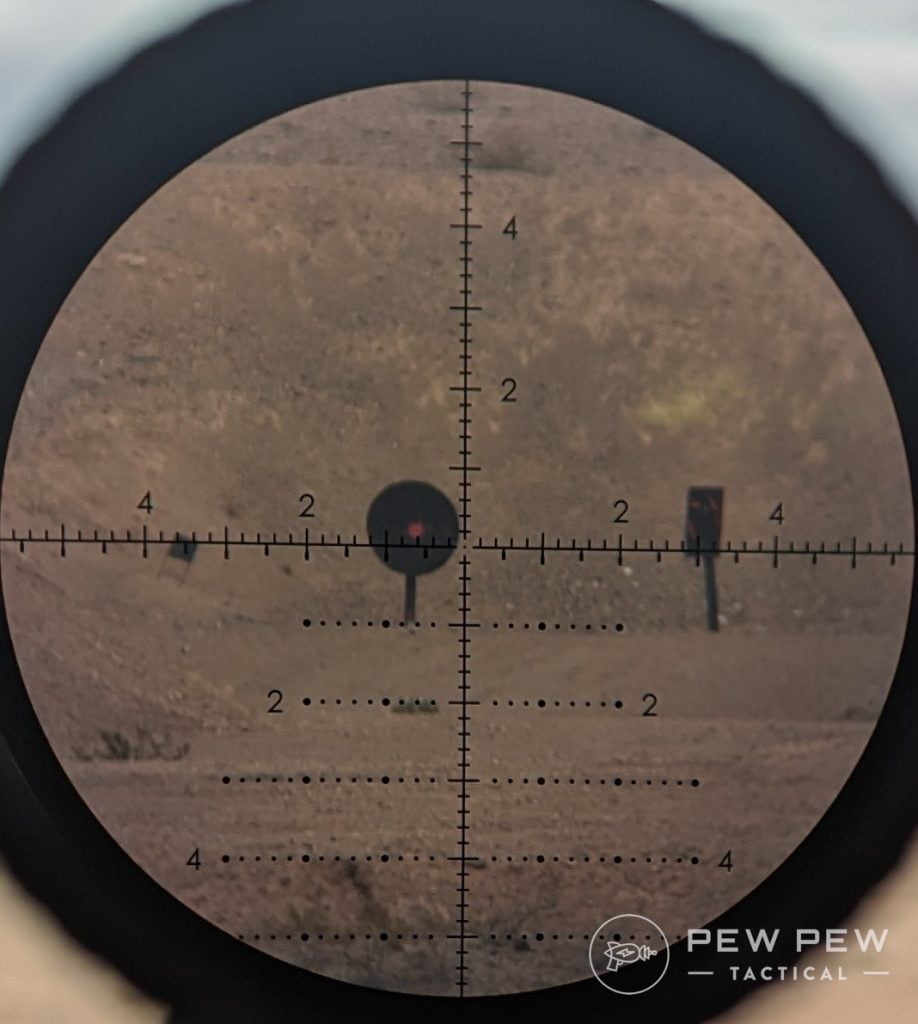
There is no beating around the bush; the Razor is an investment. It is the most expensive scope on this list, with an MSRP of $4,800. That’s going to be a tough pill to swallow for a lot of folks, but what that investment gets you is just as substantial.
Everything on this scope is designed to elevate the user’s experience without having a bunch of bells and whistles that feel unnecessary. Compared to other Vortex scopes, this thing is a tank. The exposed locking turrets are robust without feeling clunky.
One feature that is a game changer is the infinite zero locking, allowing you to set a zero between turret clicks to dial in accuracy. The 15.25-inch body is constructed of aircraft-grade aluminum with an ArmorTek coating. The marked .1 MRAD adjustment was accurate, and the Razor passed the tracking test with flying colors.
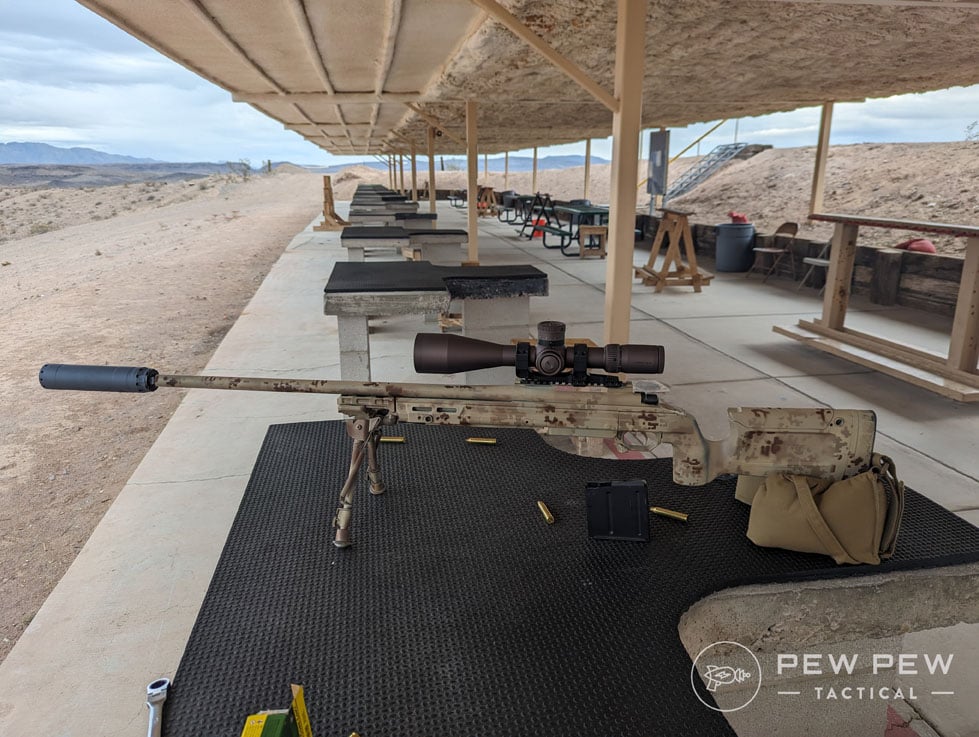
Glass on this scope is amongst the clearest I have ever looked through. There was absolutely no distortion to be found, even at the very edges of the view. The glass is so clear I could see the haze of dust in the wind on full magnification (keep in mind this can also be a detriment if your target is obscured).
The EBR-7D reticle is well laid out. The windage tree design allows for accurate ranging as well as holdovers. At 6x magnification, it is spaced out enough to use without feeling cramped, and at full 36x magnification, you have a grid layout that makes for easy follow-up shots.
The illumination makes the reticle easy to use in any lighting condition as well.
What do you think of Vortex? Rate them below.
5. Nightforce ATACR 7-35×56 with Mil-XT Reticle – Best Glass
Prices accurate at time of writing
Prices accurate at time of writing
-
25% off all OAKLEY products - OAKLEY25
Copied! Visit Merchant
Pros
- One of the most durable scopes on the market
- Great glass with a smart reticle
- Combat tested
Cons
- Expensive
- Heavy and long
- Small amount of scope tunneling
Specs
- Magnification x Objective Lens: 7-35x56mm
- Reticle: MIL-XT
- Illuminated: Digillum
- Tube Diameter: 34MM
- Weight: 39.3 oz
- Eye Relief: 3.6 in
- Lens Coating: Fully Multi-Coated
- Elevation Adjustment: 100 MOA
If you have ever seen me talk about scopes online, it should be no secret I’m a huge fan of Nightforce. I was going to include my personally owned ATACR 5-25 in this article until Nightforce got back to me with a 7-35 to keep the magnification ranges like other scopes tested.
Despite my best efforts to persuade them, I did have to send the 7-35 back.
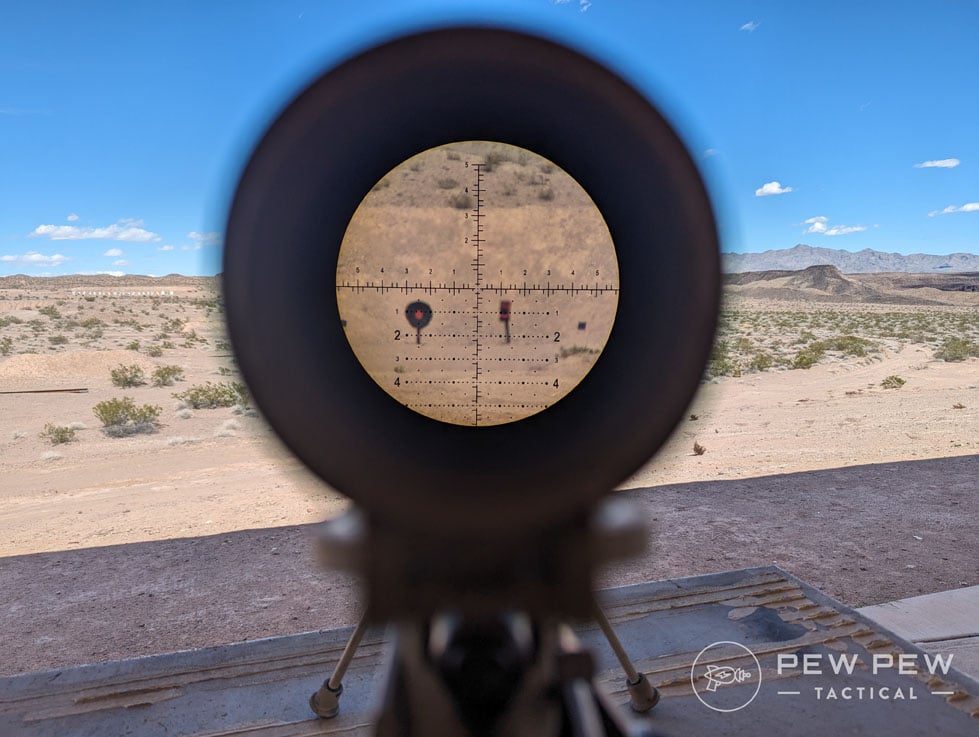
The ATACR line is one of the most durable, high-quality scopes on the market. There is a reason that the U.S. Military used the ATACR line for many years, with very positive results.
That durability does come at a cost, though, as the ATACR is one of the heaviest scopes that I tested and is second only to the Schmidt & Bender in terms of overall length at 16 inches.
The exposed turrets are beyond tough. You could probably use this thing to hammer nails and then slap it back on your rifle (though I do not recommend that). The ZeroStop system makes maintaining your zero a breeze, and returning to zero is second nature after doing it a few times. Its adjustments were true to their advertised .1 MRAD adjustment, and the ATACR had no issues passing the tracking test.
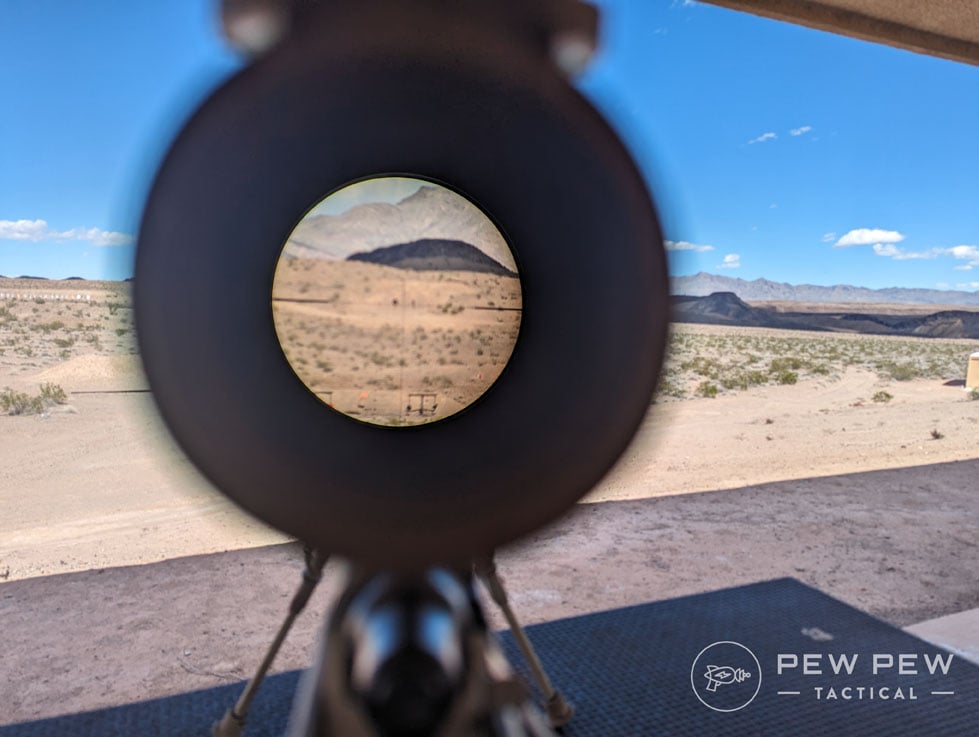
The ED glass on the ATACR is amongst the finest on the market. At all magnification ranges, the image you see is clear as you can see, with virtually no distortion (there may be just the slightest of edge distortion at full magnification when compared to the Razor or the PMII, but not enough to say it impacted my shooting).
Its Mil-XT Reticle has been the gold standard in grid layouts for many years. With a .2 mil radian hold, there is an easily identifiable difference between increments and whole radians for easy and fast holdovers. The layout allows for easy ranging and holding at any magnification range.
I will note that there is a small amount of scope tunneling with the ATACR. This isn’t as noticeable as with one other scope on this list, but it is present. If that is an issue for you, be aware of it. To some, that won’t be a turn-off, though.
6. Schmidt & Bender 6-36×56 PMII with Gr2ID Reticle – Best High End Long Range Scope
Prices accurate at time of writing
Prices accurate at time of writing
-
25% off all OAKLEY products - OAKLEY25
Copied! Visit Merchant
Pros
- Easily one of the most durable scopes
- Combined Parallax and Illumination knobs
- Top-notch glass
- Robust turrets with incredible tactile feedback
Cons
- Scope tunneling may dissuade some users
- The $4800 price tag is going to limit this purchase for some
Specs
- Magnification x Objective Lens: 6-36x56mm
- Reticle: Gr2ID Reticle
- Illuminated: Yes
- Tube Diameter: 34MM
- Weight: 33.16 oz
- Eye Relief: 3.5 in
- Elevation Turret Details: 395cm/100m MT II MTC LT
- Windage Adjustment: ± 65cm/100m DT II+ ZC LT
No list of quality rifle scopes is complete without an offering from Schmidt & Bender. This company and the scopes it produces are legendary amongst discerning long-range shooters across the globe.
The mere fact that S&B would be willing to allow me to test and evaluate one of their scopes was a huge honor, as it was my first time handling one. To say that I was impressed is an understatement.
The PMII is a monster of a scope. In terms of sheer size and weight, it is second only to the ATACR in length and weight. With that size comes a scope that will withstand even the most brutal conditions you could use it in.
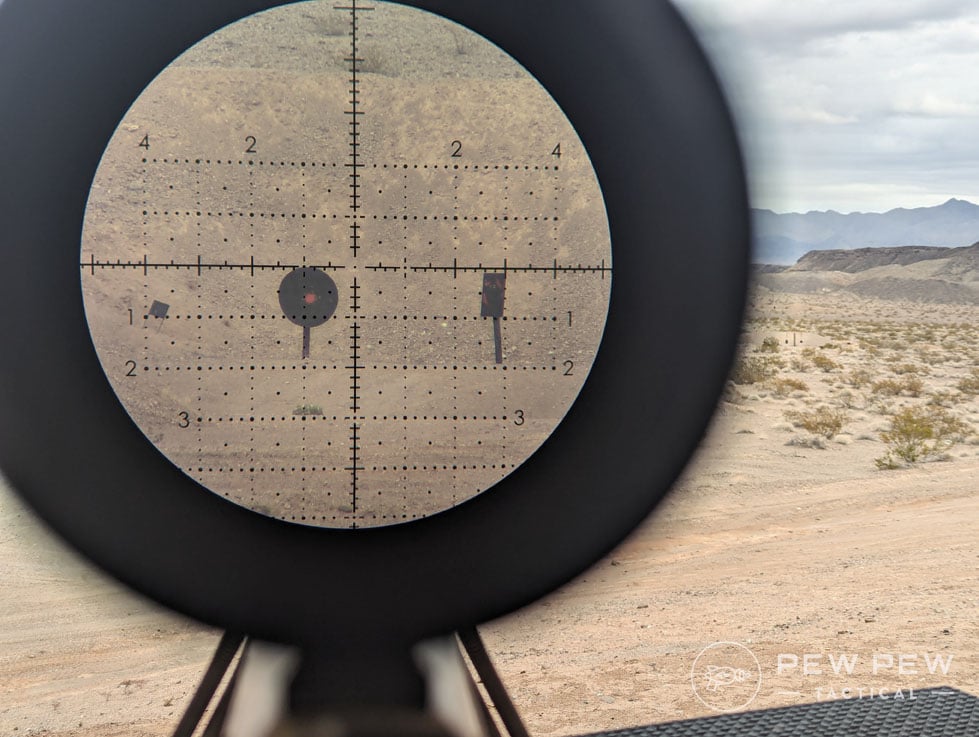
Manufactured to meet MIL-STD-810G, the PMII is stress-tested under varying atmospheric pressures, temperature ranges, saltiness, humidities, and more. To put it plainly, S&B did everything it could to try and break this scope under the harshest conditions, then scaled it up to meet those demands.
This is another scope that the U.S. Military has used to achieve some pretty stellar results in combat, and anything that can outlast a combat application is something that can survive civilian use.
One of the main selling points of all Schmidt & Bender scopes is the clarity of their glass. I’d heard talk about how much of a difference there was comparing them to many other high-end scopes, but to look through one is to understand it is something you have to experience to fully grasp.
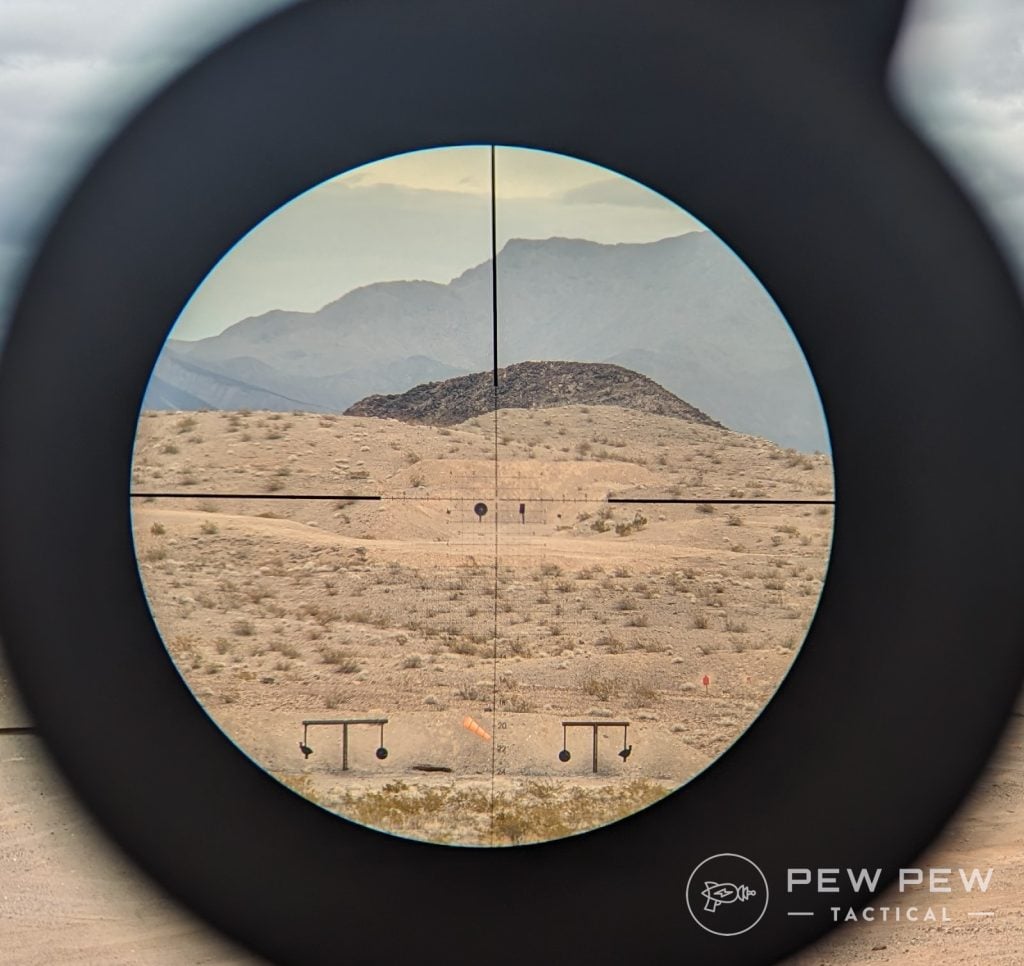
The PMII was neck and neck with the Razor HD in terms of optical clarity, and I would have needed to enlist some professional scientists to quantify the degree to which one edged out the other. Schmidt and Bender advertise that their PMII allows for 90% light transmission, and looking through this scope doesn’t feel like an embellishment on their part.
The GR2ID reticle brings a lot to the table. Clearly defined whole radians indicate major holdovers, while alternating red and black elevation lines allow for quick calculations and adjustments. Along with this, LPI (Leuch-Parallaxe Integriert, or German for “Illumination Parallax Integrated”) is new for the PMII.
The combination parallax and illumination knob allow the user to adjust parallax and illumination in an intuitive manner that requires only minimal thought after a bit of practice. This combined feature also makes the PMII very compatible with left-handed rifles, as it has freed up space on the tube and allowed for more mounting options when compared with older S&B scopes.
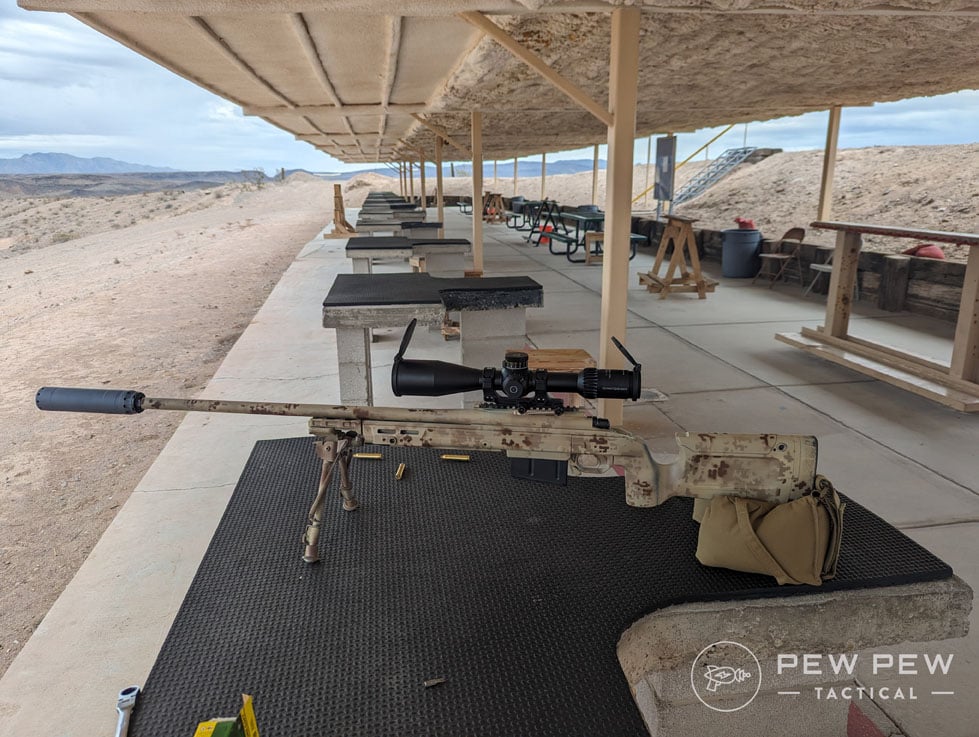
One unique feature of the PMII is the turret controls. The exposed turrets have what seems like three different settings from which you can choose. The user can lock the turrets in place, which is useful for travel or for shooting at known distances and using holdovers, or they can be set to two different “click” feels. The first is standard, though still easy to feel. The last is much more of a tactile click, providing easily the most definite feedback I’ve felt on a turret adjustment.
The PMII does have two distinct things that may cause users to shy away from it. There is no getting around the price of the scope. With the level of quality put into the PMII, the $4,800 MSRP price tag is justified but still hefty. While this will price out many shooters, those who choose to invest will find that the scope delivers time and time again.

The second drawback is that the PMII suffers from scope tunneling more than the ATACR. When dialing down from higher magnification, it is very noticeable that the field of view does not get bigger.
Comparing this to the ATACR, it is noticeable, but compared to the Razor HD, it is night and day. This is a known critique of most Schmidt & Bender scopes, and it may or may not bother you as a shooter, but it is something to be aware of.
Honorable Mentions
Two other brands frequently come up in discussions about scopes that find success in long-range shooting: Zero Compromise (ZCO) and Tangent Theta.
Both ZCO and Tangent Theta expressed their willingness to be included in this article; however, due to staffing levels and supply issues, they were unable to. I was able to check out both brands at the SHOT Show this year, and I wholeheartedly agree that both brands deserve to be on any list of great scopes.
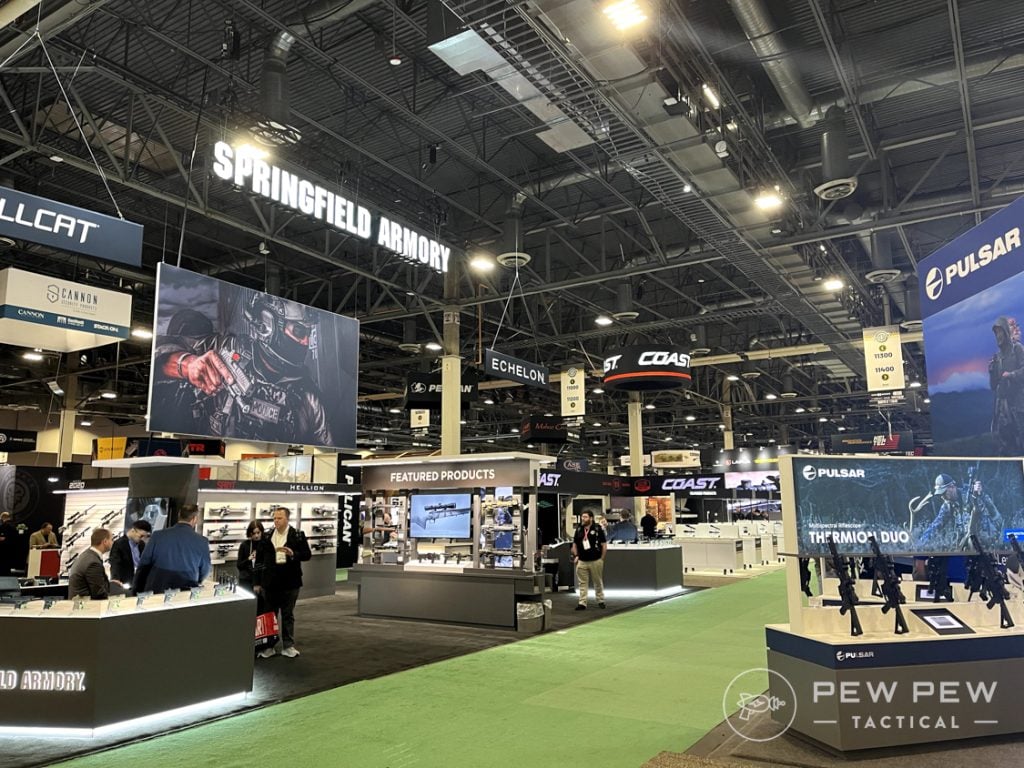
I cannot do a full breakdown, as I was only able to spend minimal time with each one, but I would highly recommend including them in your research if you are comparing scopes and brands for consideration.
By the Numbers
The six scopes we tested were rated side-by-side on clarity, magnification, eye box, and value.
We made our rating assessments after testing and evaluating each scope at the range. When rating, we used our standard metrics to determine the most suitable rating from 1-5, with 1 being the lowest rating and 5 being the highest rating.
Clarity
Clarity refers to the quality of the glass and how clear the picture is.
A value of 1 would be glass that is difficult to see through, with muddied images and lots of distortion. A value of 5 would be glass that offers a crisp picture with minimal distortion.
| Model | Clarity Rating (1-5) |
| Bushnell Match Pro ED 5-30×56 | 3.75 |
| Bushnell Elite Tactical 6-36×56 XRS3 | 4.5 |
| Primary Arms GLx 3-18×44 | 3.5 |
| Vortex Razor HD Gen III 6-36×56 | 5 |
| Nightforce ATACR 7-35×56 | 4.75 |
| Schmidt & Bender PMII | 5 |
Magnification
Magnification refers to how much closer the target appears than the naked eye. We evaluate magnification based on the picture as well as how easy the adjustments are to make.
A value of 1 would refer to a scope that tunnels to a degree that it muddles clarity or radically changes the eye box when dialed down and/or its adjustments are difficult to make. A value of 5 would be a scope that has easy magnification adjustments and does not tunnel.
| Model | Magnification Rating (1-5) |
| Bushnell Match Pro ED 5-30×56 | 4 |
| Bushnell Elite Tactical 6-36×56 XRS3 | 4 |
| Primary Arms GLx 3-18×44 | 4 |
| Vortex Razor HD Gen III 6-36×56 | 5 |
| Nightforce ATACR 7-35×56 | 5 |
| Schmidt & Bender PMII | 5 |
Eye Box
The eye box (the area around the line of sight where you can see the picture in full) is determined based on how easy and quick it is to obtain the entire picture.
A score of 1 would mean it is extremely difficult or cumbersome to get a good visual at any magnification, while a score of 5 would indicate that it is quick and easy to see the full picture on all levels of magnification.
| Model | Eye Box Rating (1-5) |
| Bushnell Match Pro ED 5-30×56 | 4 |
| Bushnell Elite Tactical 6-36×56 XRS3 | 4.5 |
| Primary Arms GLx 3-18×44 | 3 |
| Vortex Razor HD Gen III 6-36×56 | 4.5 |
| Nightforce ATACR 7-35×56 | 4.25 |
| Schmidt & Bender PMII | 4.25 |
Value
Finally, value is determined based on how much the user is getting in terms of features versus cost. Overall price tag is weighed against the scope’s specs, features, and performance.
A score of 1 would indicate an extremely high price tag with little to no features and a mediocre to low-performance level, while a score of 5 would see excellent features paired with great performance at a good price point.
| Model | Value Rating (1-5) |
| Bushnell Match Pro ED 5-30×56 | 4 |
| Bushnell Elite Tactical 6-36×56 XRS3 | 4.5 |
| Primary Arms GLx 3-18×44 | 3.5 |
| Vortex Razor HD Gen III 6-36×56 | 4.5 |
| Nightforce ATACR 7-35×56 | 4.5 |
| Schmidt & Bender PMI | 4.5 |
Overall
This is a final representation of the average score for each of the scopes based on the metrics above.
A score of 1 means we don’t think this is a great overall scope, while a score of 5 means that we highly recommend the scope.
| Model | Overall Rating (1-5) |
| Bushnell Match Pro ED 5-30×56 | 4 |
| Bushnell Elite Tactical 6-36×56 XRS3 | 4.5 |
| Primary Arms GLx 3-18×44 | 3.5 |
| Vortex Razor HD Gen III 6-36×56 | 4.7 |
| Nightforce ATACR 7-35×56 | 4.5 |
| Schmidt & Bender PMII | 4.7 |
Why Trust Pew Pew Tactical
Todd Gimian was the lead evaluator and writer for this article. Todd is a writer who covers long-range shooting and tactical topics for Pew Pew Tactical.
As a gunsmith, range officer, NRA instructor, and avid long-range shooter, Todd has plenty of time behind guns and knows what gear is needed to get the best results.
For this article, Pew Pew Tactical had six manufacturers send scopes to Todd to conduct hands-on testing, including shooting at the range.
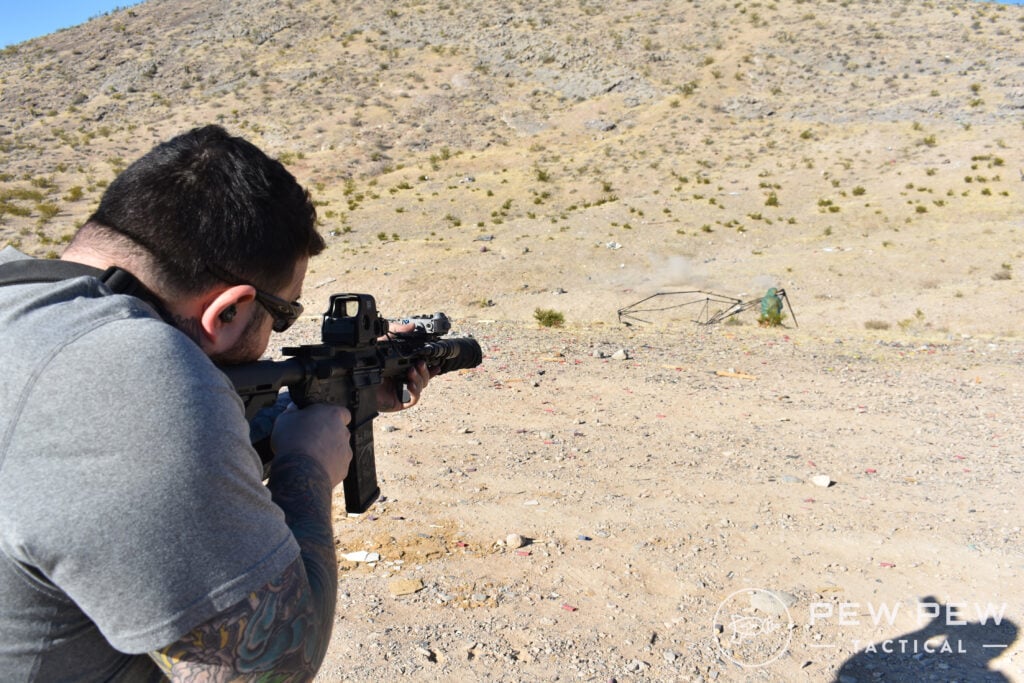
Our experienced team of reviewers is run by Editor-in-Chief Jacki Billings, a member of the Society of Professional Journalists, ACES: Society for Editing, and the Professional Outdoor Media Association.
Jacki has a bachelor’s degree in journalism and has worked as a media professional for close to 20 years, specializing in gun media for almost 10 years. She uses her professional journalism and editing experience to set testing protocols and editorial standards for Pew Pew Tactical.
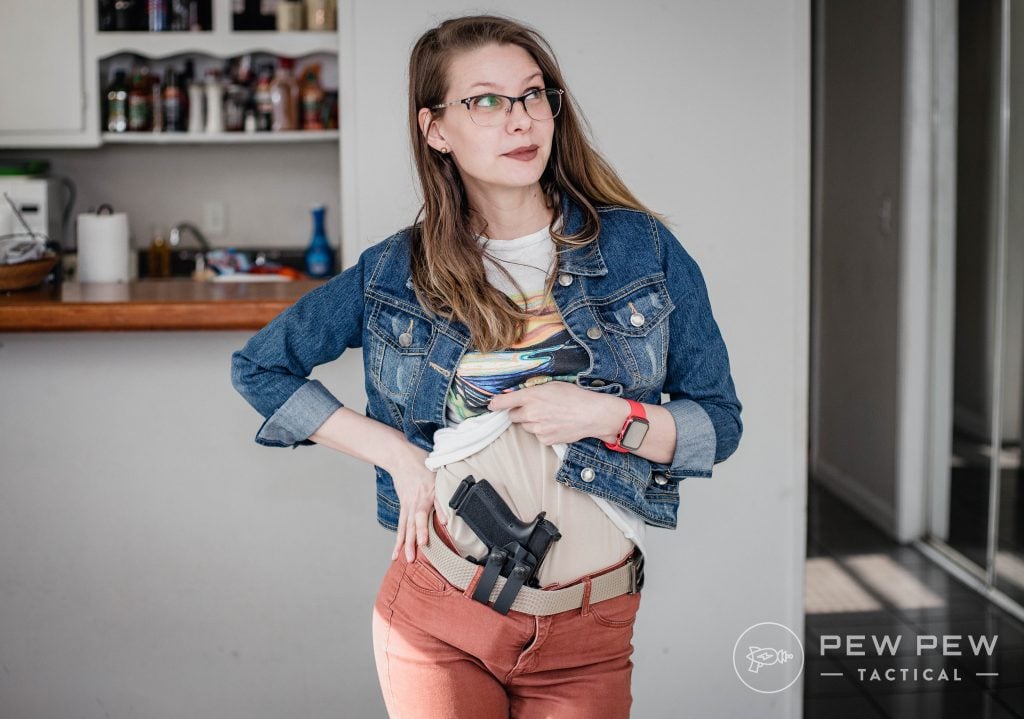
Final Thoughts
The market for high-quality scopes is a constantly changing field, with everyone trying to eke out more and more detail, including new and better features, and carve out a name for themselves as the gold standard to use.
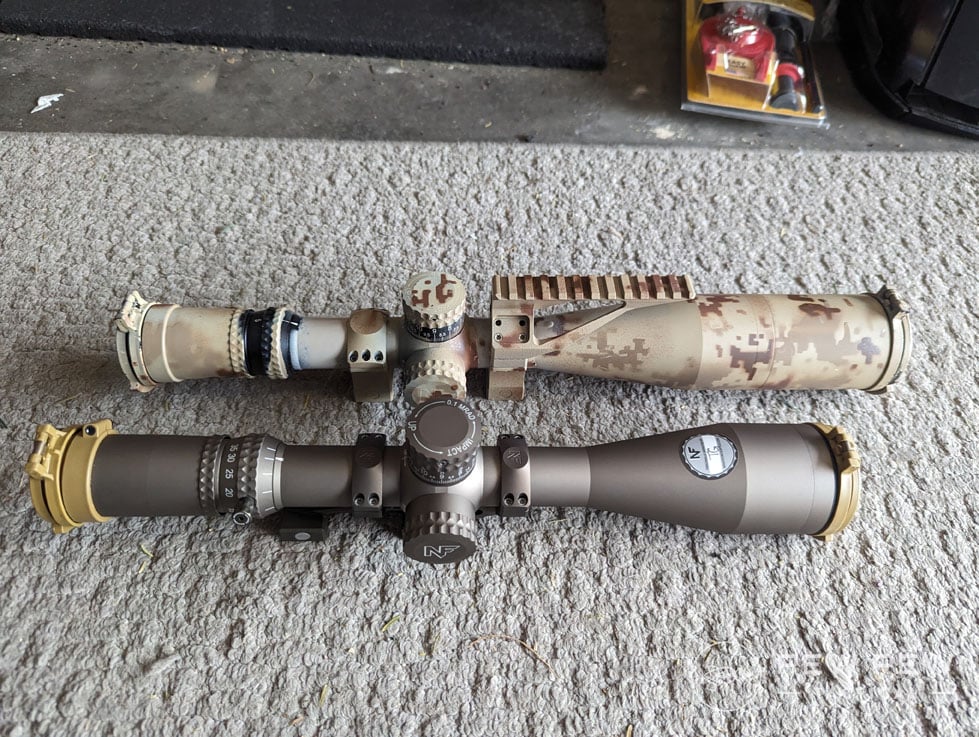
I hope that this article will help you to make an informed decision on any future scope purchases you might be making.
What is your favorite long range scope? Let us know below. For rifles that can reach out and go the distance, check out our article on the Best Long Range & Precision Rifles for Beginners.

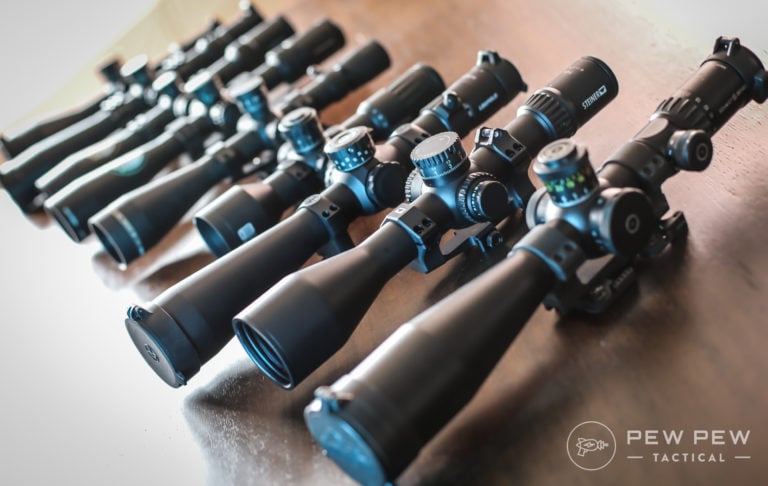
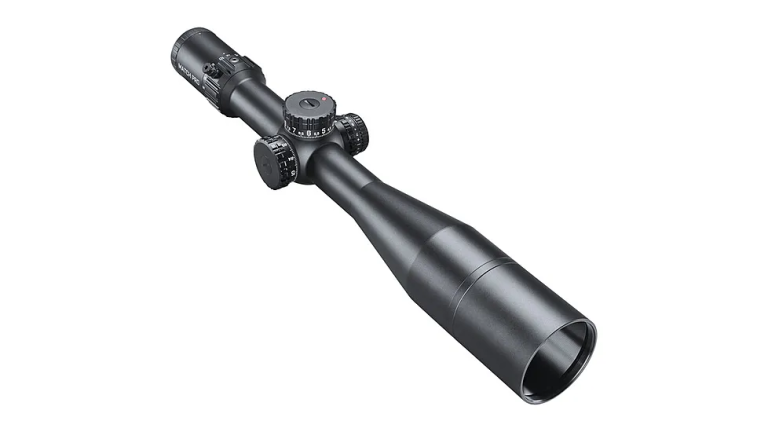
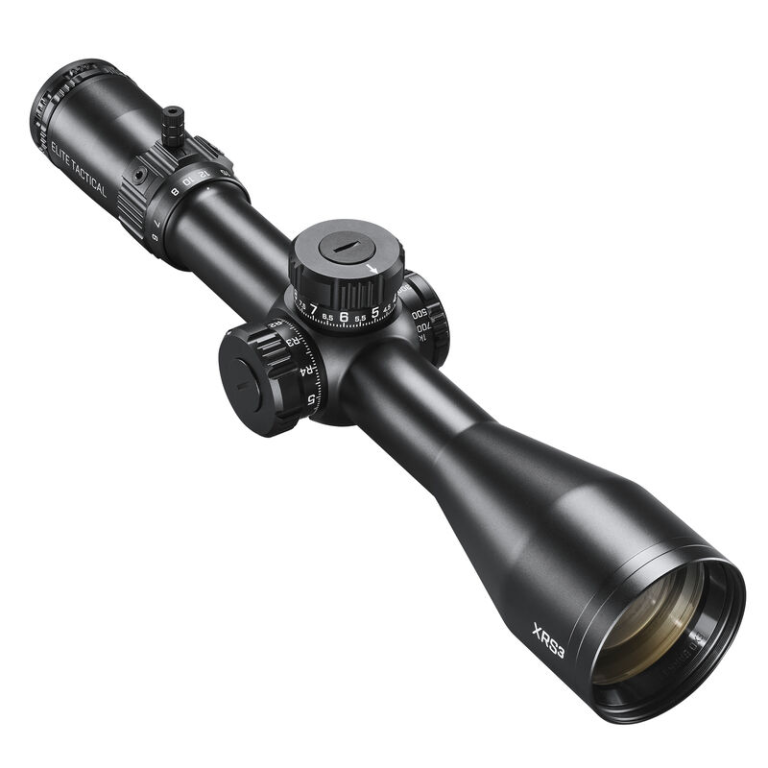
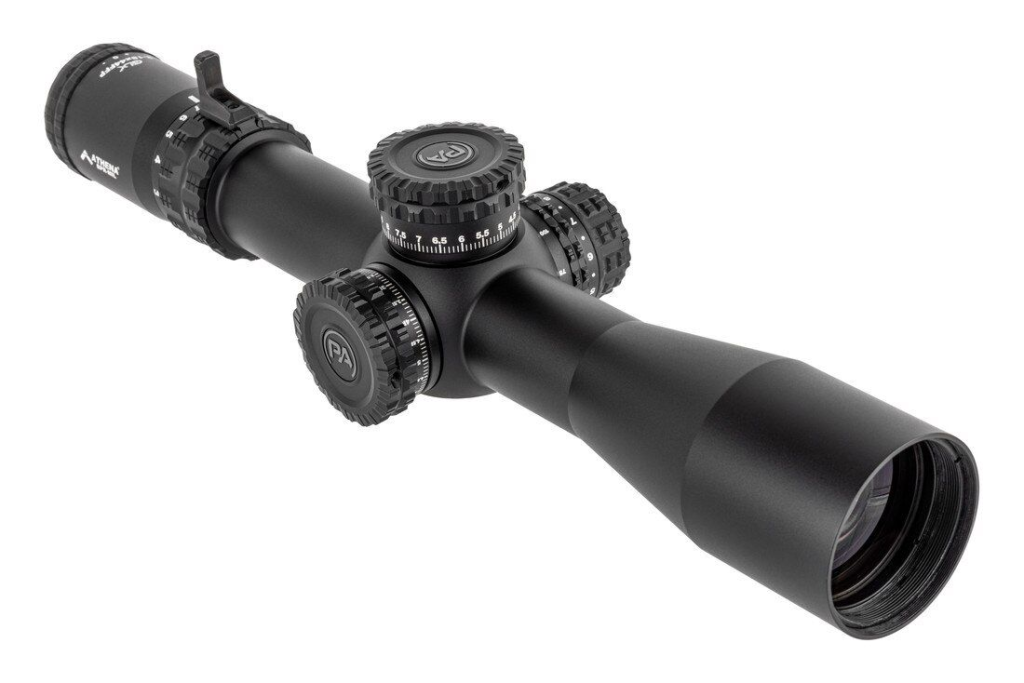
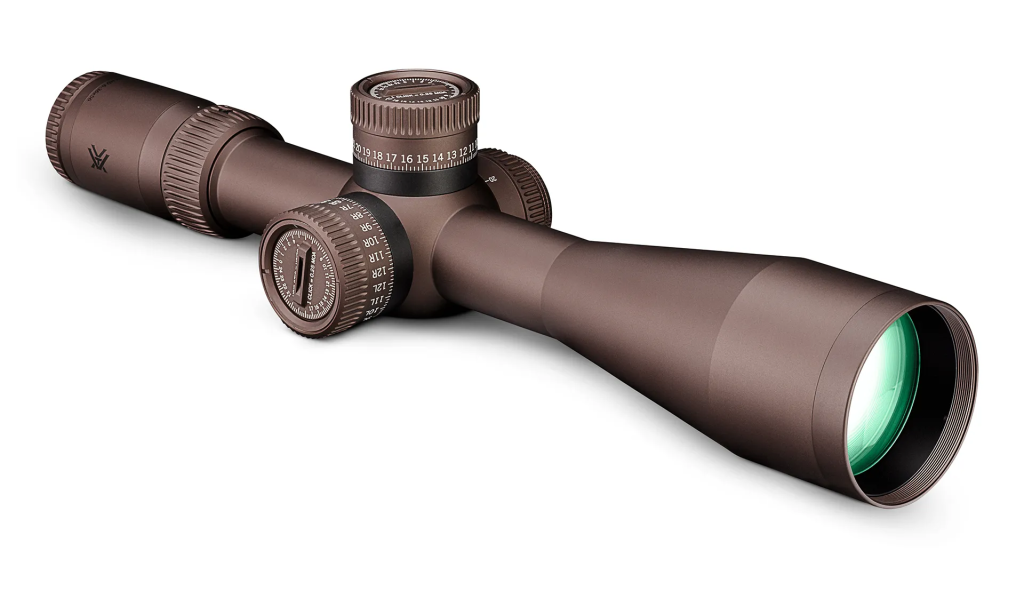
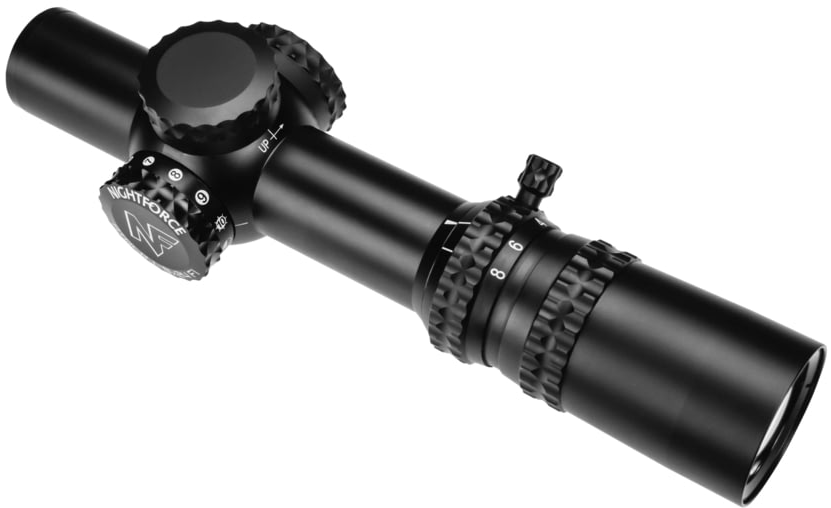
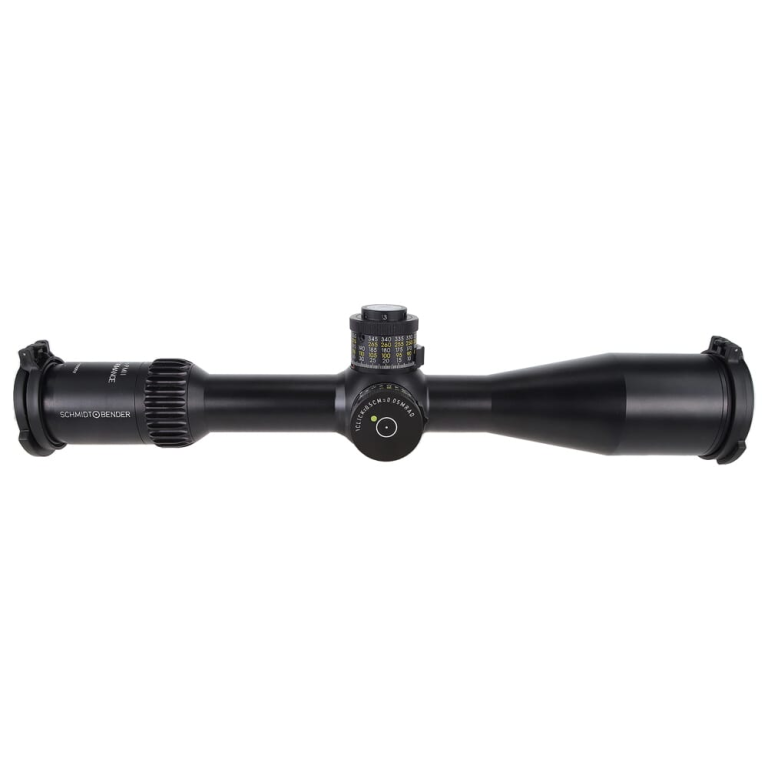







116 Leave a Reply
So guys: Was Leupold one of the ones who wouldn't send a test scope? Shame a Mark 5HD
7-35x56 wasn't in the lineup.
We didn't get a chance to test the Mark 5HD but we are do update articles when we get new products in hand to test.
Very cool, Mr. Felder! But now, you can tell us, what is *your* favorite long-distance (ELD?) scope, sir?
(I think we'll all freak if this was really him, and he actually answers!)
On your next tests please try to add a March FX scope.
Why no Leupold scopes?
I just got this and noticed the date, Somehow I am two months late, anyways just curious if any Meopta scopes were in your trials. I personally don’t really care what the end results are, I just enjoy reading your take and of course all the remarks. It’s obvious you can only review available scopes, it was cost so much to actually go out and one of every scope.
Thanks
I quit reading when I saw that 30% of the scopes on the list were Bushnell.........?
Do they keep them locked in the cabinets at walmart?
As I mentioned to someone else, I could only test the scopes companies were willing to send out. Several other companies were asked if they would like to be involved and declined for various reasons.
Then you should change the header of your article to read:
"Best Long Range Rifle Scopes [Hands-On Tested] that were given to us.
Want the best long range scope for your purpose? We hands-on test 6 scopes of companies that were willing to give us free products."
That's a MASSIVE caveat, my friend.... changes the context of your entire article.
It’s disappointing that PewPew Tactical doesn’t have a single one of the very best scopes listed, leading me to believe that this is an exercise in getting some form of renumeration for promoting brands (i.e., kickbacks).
I’ve been training with scopes made by Deon Optical Design (March scopes) and Întreprinderea Optică Română (IOR) for years — and have had no difficulty getting the performance from these scopes. On the other hand, one of the scopes recommended has a Mil reticle and MOA elevation knobs — which makes absolutely NO sense whatsoever.
One of the brands that made the TOP TEN list is horribly over-priced; very poorly made; has trashy materials with very little quality control in its manufacture — yet is recommended. Such a recommendation significantly demonstrates a lack of good judgement and/or sincere intent.
Most significantly, two of the very best — flawless — scopes made by Vortex haven’t even made the list: I have a number of each of these models on 6.5mm, .300 PRC, .338 Lapua Magnum, and .416 Barrett Magnum rifles, several custom-built (>$10k), which I have utilized in shooting out to 2000 meters.
You don’t become a rockstar learning to play on a $25 guitar.
Hi, it's more that the article is older. We're working on a full hands-on update right now.
"You don’t become a rockstar learning to play on a $25 guitar."
Ha Ha. Oh yes you can. As a kid, I traded a handful of cherry bombs from a box given to me by my Uncle in North Carolina for a closet-trash acoustic guitar that had a huge crack in it and only 3 strings from a childhood friend where I grew up in Gainesville, FL. A neighbor put strings on it, tuned it up and it's the very guitar that I learned to play. - I'm Don Felder, lead guitarist for the Eagles for twenty-seven years.
Your quote was forwarded to me and I laughed hysterically because quite a few "rockstars" I've come to know over the years all learned to play on guitars that were worth a lot less than $25.
Very respectfully, one's abilities and skills never arise from an instrument of perfection but rather the sheer determination in the absence of one.
Best regards
Every scope tested is underpowered for serious long range use. They’re all decent but most LR shooters are using at least 35 power magnification at 600 yards and over. My 22LR squirrel gun has a Vortex Razor Gen III 7-36x56 for plinking beyond 200.
Brother, great article.
Please check out the Vortex 5-25x56 Strike Eagle next time around
Interesting on how the Vortex marketing machine has tainted the review objectivity of Pew Pew Tactical... There are a few scopes missing from your list and should be reviewed (and added to the list). Delta Optical HD Stryker 4.5-30x36 FFP and 5-50x56 FFP (LRD-1T Reticle) can hang and match the features, glass and capabilities of all the Vortex offerings (and beat some of them hands-down), as well as the others listed in the top ten (with a better price point). There's the Meopta Optika6 5-30x56 RD FFP, which can also hang and match with the top ten listed. And not to be missed Athlon Optics, with its Cronus, Ares and Midas line up that should also be on that list. It's sad when marketing money has such biased influence over actual real reviews and comparisons. I hope this list is updated appropriately soon with more the world's scopes (and their in-depth reviews) that are better or as good as Vortex.
Lol, you mentioned more brands that people actually talk about than whoever came up with this list did.
It appears to me to be a Vortex bias. The research appears to be an opinion only, probably to sell Vortex Scopes. It seems very unlikely that Vortex could be that superior to Leupold, Zeiss, Schmidt and Bender or Swarovski, that have been the best scopes for decades. I have several brands of scopes and have shot with a variety of other scopes and IMHO it is hard to beat Leupold.
And Leupold’s customer service is some of the very best in the business.
I reached out to Leuopold to be included and they initially agreed and then dropped communications. I was only able to review the scopes that were sent out by companies that agreed to be included.
Zeiss never responded.
Zeiss V4 6x24x50?
Well you missed 4 of my Favorites.. TRACT TORIC 4.5-30x56 FFP, Delta Stryker HD 4.5-30x56 FFP. and Valdada 5.8-40x56 Crusader and Delta Stryker 5-50x56 SFP.. and some dont cost as much as several of the ones you mention that I had are are not near as good as the Tract Toric and Delta Sytryker HD.
And you could also include VALDADA, March and Kahles. Ive owned all of these except a NightForce.
KAHLES K624I
Sadly Kahles declined to be included int his article, that was one of the scopes that was on my initial list.
Long range scopes. Round two,
BURRIS Eliminator and a Sig scope and rangefinder combos.
How easily are they to operate in the field?
I enjoyed your article....check out the Valdada scopes which may even beat Schmidt & Bender.
I own the Valdada Crusader 40mm 5.8-40x56 and it sure beats the S&B.
What about this brand called Horus
On my .338 Lapua I use a nightforce atacr 5-25x56 f1 with tremor 3 reticle. With a scope Level by Accuracy 1st (can't say enough great stuff about the military sniper school Todd runs) and an angle degree indicator. Scope Mount is a LaRue Tactical LT845 QD that allows my SilencerCo SWR Radius Three Laser Rangefinder to be mounted above the scope (allowing me to acquire distance to target while staying on scope). Always worked well for me to 1760 and longer in every EXTREAME environment you can imagine.
Not a sniper school, been to both, one is a gentleman's course one is not.
so out of all you have been to which did you the most good at sniper/long range shooting?
Its hard to beat the Accuracy 1st Anti-Cant scope Level with Ceramic Ball for sure..I love mine. I just own 2 and they are much better than the water Bubble Level rigs.
If you can’t see the target you can’t hit it
Don't tell that to the boys with the howitzers! They'll call you....
I will not buy a Leupold based on how they handled a warranty for me in the past. It was a lower cost scope for my sons first gun and based on it being lower cost they would not replace it, only repair it and after the 3rd trip back I threw it in the trash can. I'm sure they make some good products but based on how that situation was handled, I will NEVER know.
Oh man. I've got a lower cost Leupold that could never hold zero from day one and hope to NOT repeat your experience. Maybe they just aren't aren't as good as everyone thinks.
I would love to see a review of SWFA scopes. If you’re talking best bang for the buck, they should be on the list.
Second that.
Agreed, they make some great scopes.
9 best long range rifle scopes? Where's Tangent Theta? Minox? Kahles? ZCO? Or if you're talking hunting... Zeiss? Swaro?
The only list leupold, vortex and Burris should be on are budget scope lists.
We have a very large update to this article coming soon!
Agree would have to say Zeiss and Swarovski and Nightforce all some of the top notch scopes for long term lasting and quality but think Steiner makes some of best military rifle scopes and very tough with extreme good glass
My friend has a 6.5 CM, A10, 24" HBAR to use for intermediate ranges? I know, but it's what he wanted. Anyway, would a Primary Arms 1-6x24 SFP Gen III Illuminated ACSS work? It's listed for a .308 and I'm not certain how that would translate to a 6.5 CM. He wants it for sub 500yd. shooting.
1-6 imho might be a bit lite for 500yds. depends on glass quality. i use a bugbuster 3-9x32 ($80) on my ar, and 9 power is really pushing it at 500yds. all depends on the quality of the glass. i have a 6-24 SFP that cost $139 i use on my Savage 10 in .308 out to 1000yds. and i've used a schmidt & bender ($3200) 5-25 on a .300 winmag from 1000 yds out to 1600 yds. NO comparison between them. the SB at 12 power all the way to 1600. 1000 yds with the chinese scope at 24 power, the SB is miles upon miles clearer, but also 23 times the cost. Clarity of glass, amount of elevation avail are better than magnification. but for 500 yds, almost anything will get you there. 6.5 cm is still supersonic. if the glass is really, really good you won't use the magnification so much. which gives you a wider field of view and that's always good. the 6.5 shoots flatter, has longer range, and has better BC (ballistic coefficient) than the .308.
Thank you for the article it was very helpful. I was wondering if you had anything thoughts on the Vortex Diamondback 6-24x50mm and its capability for long range.
Never assume that your readers will be familiar with abbreviations. Always spell them the first time you use them in an article, then identify the term under its acronym.
First time viewer, enjoyed the discussion and your approach. My compliments on a job well done. Been shooting (competition target as a youngster, hunting as an elder) since 1948. Looking forward to much more. Thanks for your efforts.
If I may,Id like to mention anothrer scope I have..Its my "GO TO SCOPE" .Its SWFA 3-15x42 SS.
I grab this 223 Wylde AR15 & SWFA Super Sniper scope 1st when there is a problem..I bought the scope used at a pawn shop for $550.00..when I first got into long range shooting.At the time it was the most expensive scope I'd ever purchased..It is as reliable as Gold.
Ive got a few Im proud of you might check out.. The Athlon Cronus BTR 4.5-29x56 and the Valdada TX Raider are my best so far...And for a lower price thats really good glass is fairly new kid on the block..its the Arken EP4 6-24x50 and the Primary Arms GOLD GLX 6-24x50.. I especially like the turrets on the GLX Primary Arms. You did a great review.I enjoyed it.Thanks
The Ares BTR & ETR are both great scopes also. The BTR to 6-700 and ETR past 1000.
Check out a scope called the Valdada
Any thoughts on the golden eagle by Vortex?
I hear a lot today about what people think the best optics are. The problem is that marketing of the big manufacturing companies seems to drive these opinions so you only really hear about the big 6 or 7 manufacturers. During the time I was in the Army I worked in the ophthalmology clinic (eye clinic) and OR. Most of the optical equipment was, and still is, Zeiss - I figure there must be a good reason for this. So after I buy a rifle, I decide on what optic I want, save up for a while, and get what I believe is the best optic. What do you think?
I fully agree. I worked for thirty years in OR and all the best optics we had were Zeiss or Leica, and for good reason. For my driven hunts and long distance target shooting, went for Leica scopes(the local Zeiss dealer unfortunately is anti gun). Yes, I paid top money but all three scopes I have from Leica are simply superb, especially in low light conditions.
Simon your right. Ive got a Zeiss 3-9 ...I purchased it in 1986 and its still as clear as ever.They are a top optic still.
For the next round, how about the Vortex Diamondback Tactical 6-24X50?
I haven't used the 6-24x yet but I have used the lower magnification version a LOT. Very happy with it, for the price it does a great job in every area.
I agree. Put one on my Savage 12FV in 6.5CM.
Very impressive. Clear. Powerful. Smooth.
Very impressive for the price!
Great value.
Brad M,
I have the Vortex Diamondback FFP 6-24 and for a $400. scope its hard to beat. .Its better than a bunch that cost $800 to $1,000. I have it on a 224 Valkyrie shot 1000 yards.
Have you tried the
ATN 4.5X25 site II
Battery sucker but nice from my use
Or
Athlon Cronus BTB 4.5X29 56mm scope?
I personally love this scope and I paired mine wit a unimount from Spluh.
Hold zero very well and I swap out with my ATN since the ATN has the mount built in.
What are your thoughts?
We're testing an Athlon Cronus right now! Like it a LOT so far, we'll have that review soon...ish.
Have you a review of the Leatherman Hi-Lux ART 6X24X50 scope? I find the option interesting.
I've never heard of it before now, looking at their website... it does look very interesting. I have tech questions that concern me, but if we get the chance to try one out we will!
David,PPT Editor...I have the Athlon Cronus BTR and I love it..
Bounce down to the Ares BTR 4.5-27x50 and the Ares ETR 4.5-30x56. Both are great scopes and punch well about their price point.
I'd like to see a Nikko Stirling from Legacy Sports included in the next round.
I'm looking very hard at their Howa 1500 26" HBR 6.5 CM, in an MDT Oryx chassis, which I believe they'll package with a Nikko Stirling Diamond FFP 4x16 for $1100.
Since Uncle Sam doesn't foot the bill, Nightforce and Schmidt and Bender aren't options for me...
We're currently reviewing the Howa 1500 Mini-Action in an MDT Oryx Chassis with the Nikko Stirling Diamond FFP 6-24x scope!
The action and chassis are good to go, but the scope won't end up on this list. Nikko Stirling is barely decent, the features are nice, the glass is okay, the turrets and reticle are fine - but it has very little in terms of durability while also coming with a disappointing warranty. In the face of other brands like Vortex and Athlon that are the same price range, offer a more durable scope, better glass, better reticles, and lifetime unlimited warranties - I have to recommend them instead.
Because bigger is not better, magnification is overrated
Should update this list with PA's new offerings.
What are your thoughts on the Sig Sauer BDX line of scopes and rangefinders. So far with the proper use of the App that goes along with the other two parts it's great to see the hold points illuminate and have rounds on target on the first engagement of a cold bore shot.
We have a complete hands-on review of the Sig BDX! It is very cool tech, but it's a bit niche. For hunting, I would say it really shines and can be outstanding, but for precision long range it falls a little short.
Have you checked out any of the new Zeiss V series scopes?
Not yet but I hope to have some Zeiss stuff in the update!
I'd like to second the mention of Athlon Optics scopes. I've been seeing good user reviews but your article provides much more meaningful information than just a text review. If you get the chance when it comes time to do the follow-on for this, I'd be grateful to hear what you've got to say about them. They're mostly closer to entry-level as price goes, but that's probably the audience that most needs quality advice. (For example, the Argos 8-34x56 appears to be slightly cheaper than any of the scopes you've mentioned here while apparently maybe offering better magnification and light than the Strike Eagle)
Anyway, the detail you offer in this article is really great, so thank you for taking the time to include through-scope images, groups, and impressions from mount to shoot. As someone just getting started in long-range shooting, it's nice to get experienced advice on what's out there.
We're working on getting some Athlon scopes in hand for our update, we've heard very good things about them so we're looking forward to giving them a shot!
John I have an Athlon Cronus BTR 4.5-29x56 IR APRS MRAD on my Remington 700 PCR 6.5 Creedmoor and it is a very nice scope.Starting to really make a name.The Valdada TX Raider is the most expensive scope I own and looking through them both side by side its hard to tell one from the other..And the price difference is quite a bit.
Hi John I just purchased an Athlon Argos BTR Gen II 8-34x56 MIL MRAD scope. I love it Extremely clear optics and packed with features normally seen only on Night Force. I have a tight budget so not only is this a great choice for me but I mounted it on the Midwest Industries 20MOA 1 piece 30mm mount. I'll find out soon enough if this will work for 1000+ yards. Don't think it will be a problem
I am interested in a high end shoot out! USO, Nightforce, Schmidt, Tangent Theta, Kahles, Minox, Valdada, ect.! Please make it happen!!!
Spending the last week in Denver, I was very disappointed that I was only able to get my hands on two of these scopes, & they weren't in the same store. I would love to compare high end scopes, side by side but find it extremely difficult to find places that carry them!!
Are you kidding me? There are about ten scopes that top that list! USO, March, IOR and Valdada Recon G2 which is probably the best and the best buy having Schott glass inside of it. Its amazing how somebody does a little reading and thinks they know something about good when they have no clue!
Thanks Ken, I'll check those out for the eventual update.
Thank I for all the insight. It's all so much to learn at once.
Eric; your article has to be one of or more than likely the best informative article I have ever read,. Thank you so much for your time and effort excellent job. Sometime in the near future I would appreciate if you would do a comparison article of scopes. This time possibly compare different models of the Athlon vs Osprey scopes. I have the Athlon helos 8x34x56mm cost 565 dollars. I don't have a lot of experience in LRS. The scope sits a top a Savage model 10 tactical. Before I ever fired the gun I installed a Witt muzzle brake on the 6.5 Creedmoor. I have had both shoulders replaced along with 5 other joints but whose counting. I took my 204 Savage model 12 factory and the 6.5 to the range. I shot 10 rounds at 100 yds. from the 204 five to dial it in . The next 5 32 grain Hornady Varmint touched together in a .441 center to center group not bad for a 70 yr old. I then placed the 6.5 in a cradle not knowing what too expect I leaned into it fired an to my surprise minimal recoil. I removed it from the cradle then set it on bags. After 8 rounds to dial it in.. I then shot a .837 in. group with Hornady Match ELD 140 gr. 6.5 Creedmoor. The recoil was so slight I could have shot a 100 rounds. I am looking forward to visiting my other club which has a 300 yd. range that you can drive to the 300 yd target. Thank you again for the article fantastic. If you get a chance take a look at the 8x34x56mm Athlon Helos . If you could please let me know what you think. Again Thank you Rick Shoop
Where does SWFA-SS (e.g. SWFA SS 3-15x42) fit in?
Re: the Leupold Mark 5HD - it has a 35mm tube (I own one), but you said you used a 34mm mount? Uh oh…typo?
Besides that, I like the article because you simplify a complex subject and inject some humor in there. Especially appreciated the eyebox comparo, as that is a quality that does not come across in specs. As a prairie dog shooter who stares through that glass pipe all day, eyebox is really important to me.
I would add the FFP Hensoldt’s to the test, the $7k ZF 3.5-26x56 and $3k ZF 4-16x56 (only because it’s within S&B price range). I hear they have the absolute best eyebox’s out there.
FWIW, that TiborasaurusRex fellow on YouTube mentions he has it on good authority that the top end Primary Arms, Vortex Razor, and NF scopes all come from the same factory in Japan. The majority of the price differential comes down to quality control, warranty, and slight glass differences according to him. If you look at the specs, they sure look similar.
Very Impressive article. everyone should need to know the impotent fact before the buying a rifle scope. You wrote the awesome impotent fact in this article.
Thanks for sharing
“Impotent!"
You keep using that word. I do not think it means what you think it means.
what's your thoughts on LVPO's (maybe future content?) scopes like a 1-8x ? Scopes like the NX8 and Accupower 1-8 are insanely accurate in short and medium distances. In longer distances you won't be achieving tight groups but you'll hit steel/paper without issue.
Big fan of LVPO optics, it just depends on what you want to do with your weapon. Take a look at our 3 Best 1-6x Scopes article!
You missed one of the better deals on the market. The Nikon Black X1000 series. The 24 - 50 is MIL or MOA. FFP and Illuminated for $800. Currently on sale at Bass Pro for $650. A very good scope. I own two.
Thanks for the suggestion!
Why not higher power scopes. Like a March Optics 10 to 60 power. Granted you don't need that much for man size target but why not basket ball size targets.
Ultra high magnification optics start to work against the shooter. Mirage becomes more of an issue, field of view gets restricted (important for seeing vapor trails), reacquiring a target after each shot can become nearly impossible, and the biggest issue is elevation adjustment - ultra long range shooting requires a huge amount of scope adjustment, even when using a 40 MOA scope base the adjustment required is rarely available on something like a 60x scope. 25 and 30x are generally the very upper limits of what long range shooters use. Many never go past 18x - even for 1-mile steel shooting.
Mirage being an issue? Are you mag dumping at 3000 yards? I highly, highly doubt heat dissipation will be an issue if long range shooting is your game.
Not mirage due to heat from the barrel, but mirage coming off the ground is very much a real issue and doesn't even require a large temperature difference between the air and ground to occur, especially when using magnified optics.
It is also important to be able to see the mirage to read wind conditions between you and the target, using too high of a magnification prevents the field of view necessary to being able to see enough of the area to see all of the differences between shooter and target.
Here is a great video on the topic: https://www.youtube.com/watch?v=DKM-RQg9OPc
Fair. 99% of shooters don’t need magnification above 30x for their application, high power becomes extremely technical beyond most shooters skills. The right reticle with holdovers would benefit that 99%
My Schmidt Bender PMII Ultrashort 3-20x50 has 35 Mils of elevation adjustment which converts to 118 Moa.
And no IOR? Not a great test, The IOR Recon and IOR Crusader with 40mm tubes, high end glasses AND affordabel prices would match them all.
I have a NF ATACR 5-25 and have looked through others at the range, none compare to my NF. Yes its big, heavy, and expensive but it is durable and NF customer service is second to none. Additionally, I dont know of a scope with more elevation adjustment, 120 MOA! It will laugh at 1000, and keep on going.
I am definitely not in the SB, Kahles, etc market. I really liked you including Primary Arms, Burris, Strike Eagle, etc. A very crowded segment of the market. A few I would love to get a consistent comparison on: Nikon FX1000, Sig Sauer Tango 4, Althon Ares, and whichever Sightron you would add to the mix. I agree with one of the other posts that adding a SS makes sense as well, I believe their top of the line HD variable is about $1500.
Thanks for another great article.
JB
The only problem would find someone to do the small morgege to do the financing in order be able to get one of these beautiful scopes. Wow! Too rich for my blood. I guess I'll have to keep the old crappy iron sites.
How do you think about Bushnell Elite Tactical HDMR 3.5-21X50 ?
Best scope in the ($1200-1500) pricerange, and the g2dmr reticle is my personal favorite.
Old article but I'll comment anyways. For value vs performance it's hard to beat Nikon glass. I've gone to them for all of my rifles, spotting scopes and binoc's.
I feel like SWFA is a great scope at a bargain price. I'd like to see your opinion on it. A bargain at $250 vs $1000 scopes.
I've seen alot of comments on them both positive and negative. Hard to tell which to believe. I've already been taken by buying Osprey Scopes. Total junk.
I've had mine for about 10 years so I can only comment on mine. I saw lots of positive comments before buying and I havent been disappointed. I know they have come out with HD models in recent years so I cannot give any info on them but the fixed 20x that I have is great and I would say it rivals some much H more expensive scopes.
Maybe that would be a new blog. Budget scopes that really are worth it.
Nice article. I personally like getting other people’s opinions just to add additional knowledge. Sometimes it’s as simple as budget. Some may not have any restraints. I have a XTRII and it works for me. I also have several vortex viper FFP 6x24’s gen 1’s. They may be my favorite for my recreational shooting. You want your shooting abilities to match your equipment at least a bit. If you shoot at a non private range and are sporting a 8k rig everyone is checking your groups as they should.
Steiner M5Xi 5-25x56. Absolute best long range scope in existence. I can't believe that Vortex has 2 scopes on the list and Steiner didn't get a shout out. You must have used Google for all of the information in this article. Go back to your celebrity plastic surgeons.
Robert you need not agree with the writer, it's an opinion. Regardless of what is being reviewed, glass, uppers, lowers, ect. There will always be differing opinions. Don't take it personally Robert, she may actually educate you if you turn down the testosterone! Lastly, there is no reason to be an asshole and insult this individual. You're being a child, go back to your sandbox sir.
Your comment is rather hypocritical don't you think? Be a part of the solution not part of the problem Deputy8224!
Did you even read the article? There is a Steiner at #6
As the Army no long funds my optics, the goto optics I use and seen a lot of on the line are the Bushnell products. And since I like to keep my LR rig tacticly capable, the Elite DMR II 3-21x with a Horus H59 hits my sweet spot for under $1500. They also have a nice 3i reticle for those who prefer a less busy recticle and dont mind dialing.
You missed one of the other really GOOD 1000Yd Optics.... the Burris EliminatorIII
Will have to check that one out...hopefully it will be at SHOT.
I have the Burris Eliminator III. I love it, crystal clear, FFP, 1 battery can calculate 5,000 shots, does great with different light conditions, fog proof, the way you mount it only allows it to be mounted correctly so no need to use the bubbles to make sure it's all level. I highly recommend. Talked the store down to $1,462 for it. I'd buy it again at MSRP.